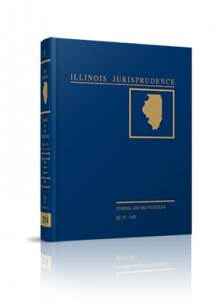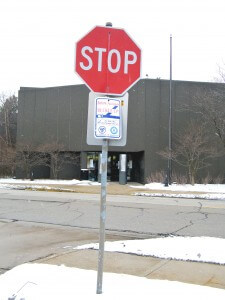Crimes Involving Bodily Harm:
Assault: Assault is defined as causing someone to fear that you are going to physically harm them. Simple assault is a Class C misdemeanor, punishable by up to 30 days in jail and up to a $1,500 fine. In addition, you may be ordered to perform between 30 and 120 hours of community service. (720 ILCS 5/12-1). See our related blog: The Illinois Law on Assault.
Aggravated Assault: Basically, you may be charged with a Class A misdemeanor, punishable by up to one year in jail and up to a $2,500 fine, if you cause someone to fear that you are going to physically harm them when using a deadly weapon or when wearing a disguise or the victim was over the age of 60 or physically handicapped. You may also be charged with a Class A misdemeanor if you threaten various government officials such as case workers or teachers. (720 ILCS 5/12-2). See our related blog: The Illinois Law on Assault.
If you shoot a weapon from a car, you may be charged with a Class 4 felony, punishable by one to three years in jail and up to a $25,000 fine. (720 ILCS 5/12-2)
Battery: You may be charged with battery if you cause bodily harm to or make physical contact of an insulting or provoking nature with a person. This is a Class A Misdemeanor, punishable by up to 1 year in jail and up to a $2,500 fine. (520/ILCS 5/12-3). See our related blog: Illinois Aggravated Battery Law.
Battery to an Unborn Child: If you intentionally cause physical harm to an unborn child, you may be guilty of a Class A Misdemeanor, punishable by up to 1 year in jail and up to a $2,500 fine. (720/ILCS 5/12-3.1).
Aggravated Battery: Aggravated battery can be based on the type of injury, the type of victim or the place of the offense. Charges can range from a Class 3 to a Class X Felony with a penalty range of 3 to 60 years in prison. If guns are involved, you could face a minimum prison term of 20 years and have up to 25 years added to any sentence if you harmed a child under the age of 13. (720 ILCS 5/12-3.05). See our related blog: Illinois Aggravated Battery Law.
Domestic Battery: If you cause bodily harm or make physical contact of an insulting or provoking nature to a member of your household, you may be charged with domestic violence. A first offense is a Class A Misdemeanor, punishable by up to 1 year in jail and up to a $2,500 fine. A prior conviction or use of a weapon is a Class 4 Felony, punishable from 1 to 3 years in prison and up to a $25,000 fine. There are additional penalties for committing domestic violence in the presence of a child. (720/ILCS 5/12-3.2). See our related blogs: Illinois Cracks Down on Domestic Violence Offenders and What is a Dating Relationship Under Illinois Domestic Battery Law.
Vehicular Endangerment: If you throw something off an overpass at a car, you may be charged with a Class 2 felony, punishable from to 3 to 7 years in jail and up to a $25,000 fine. If death results, you may be charged with a Class 1 felony, punishable up to four to 15 years in jail and up to a $25,000 fine. (720/ILCS 5/12-5.02).
Stalking: Stalking generally includes knowingly engaging in a course of conduct directed at a specific person, where you know or should have known that this course of conduct would cause a reasonable person to fear for his or her safety or the safety of a third person or suffer other emotional distress. Stalking is a Class 4 felony punishable by 1 to 4 years in prison. Repeat offenses are a Class 3 felony, punishable by 2 to 5 years. (720 ILCS 5/12-7.3).
Cyberstalking: Generally, you commit cyberstalking when you engage in a course of conduct using electronic communication directed at a specific person, and you know or should have known that your conduct would cause a reasonable person to fear for their safety or the safety of a third person or would cause other emotional distress. Cyberstalking is a Class 4 felony punishable by 1 to 4 years in prison. Repeat offenses are a Class 3 felony punishable by 2 to 5 years. (720 ILCS 5/12-7.5). See our related post New Cyberstalking Law in Illinois.
Homicide:
In Illinois, a homicide can be charged as first degree murder, second degree murder, involuntary manslaughter and reckless homicide. The difference in the charge can depend on your state of mind.
First degree murder means you intended to kill someone without legal justification or you knew your actions created a strong probability of death. You can also be charged with first degree murder if the death occurred while you were committing a forcible felony. The penalties for first degree murder include life in prison and possibly the death penalty. (720 ILCS 5/9-1).
Second degree murder means you committed first degree murder but you either acted under a sudden and intense passion caused by serious provocation from the victim or you unreasonably believed you acted in some type of self defense or defense of another. Second degree murder is a Class 1 felony punishable by 4 to 15 years in prison. (720 ILCS 5/9-2).
Involuntary manslaughter means you unintentionally killed someone without lawful justification where your acts, even if they were lawful, were likely to cause death or great bodily harm, and you performed those acts recklessly. If your actions involved driving some type of vehicle, you may be charged with reckless homicide. Both involuntary manslaughter and reckless homicide are generally Class 3 felonies punishable by 2 to 5 years in prison.
(720 ILCS 5/9-3).
See our related blog What is the Difference Between Murder and Manslaughter in Illinois.
Drug-related Crime
Drug Possession: Depending on the type of controlled substance, counterfeit substance or analog, charges against you may range from a Class 1 felony to a Class B misdemeanor. See 720 ILCS 570/402.
Manufacture and Delivery: If you are manufacturing or dealing a controlled or counterfeit substance that is on the narcotics schedule, you can be charged with a Class 1, 2 or Class 3 felony depending on the amount and the substance involved. See 720 ILCS 570/401.
Also see our related post The Law On Proving Possession of Drugs or Weapons in Illinois.
Crimes Against Property
Retail Theft (720/ILCS 5/16-25):
Up to $300: First offense: You may be charged with a Class A misdemeanor, punishable by up to 1 year in jail and up to a $2,500 fine. If you used an emergency exit, it is a Class 4 felony, punishable by 1 to 3 years in jail and up to a $25,000 fine. Subsequent offenses: You may be charged with a Class 3 felony, punishable from 2 to 5 years in prison and up to a $25,000 fine.
Above $300: You may be charged with a Class 3 Felony, punishable by 2 to 5 years in prison and up to a $25,000 fine. If you used an emergency exit, you may be charged with a Class 2 Felony, punishable by 3 to 7 years in prison and up to a $25,000 fine.
See our related blogs: From Shoplifting to Removing Price Tags: Retail Theft Law in Illinois and Retail Theft: Second Offense and Beyond.
Robbery: You may be charged with robbery if you take something from another person (other than a car) by force. Robbery is a Class 2 felony, punishable by 3 to 7 years in prison and up to a $25,000 fine. If the victim is elderly or a child or a day care, robbery can be a Class 1 felony, you may be punished by 4 to 15 years in prison and up to a $25,000 fine. (720 ILCS 5/18-1). See our related blog at: The Law of Retail Theft, Theft, Robbery and Burglary in Illinois.
©2020 Matt Keenan. This website is designed for general information only. The information presented at this website should not be construed as formal legal advice nor the formation of a lawyer/client relationship.


